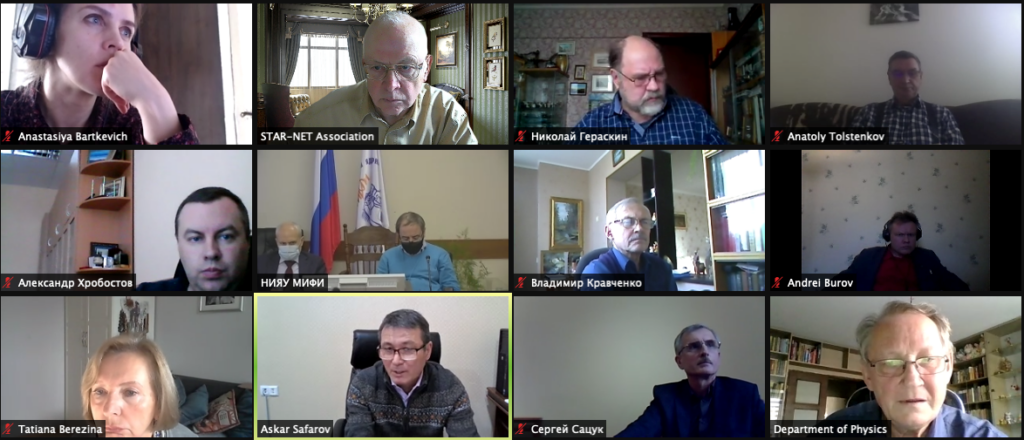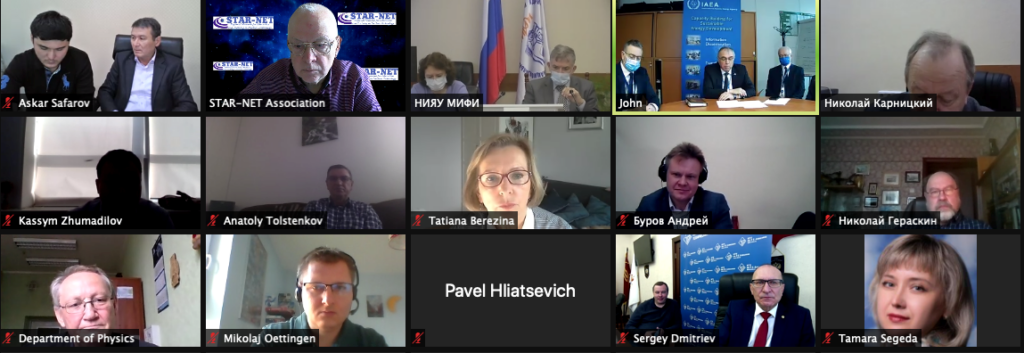
The VI General Assembly of the Regional Network for Education and Training in Nuclear Technology STAR-NET was held on November 25–26, 2020 in the form of an online conference. More than 30 representatives of 11 universities-members from Azerbaijan, Belarus, Kazakhstan, Poland, Russia, Uzbekistan, Ukraine and the IAEA took part in the event summing up the results of five years of the network’s work and identifying further areas of cooperation in the field of nuclear education.
The Deputy Director General of the IAEA, Head of the Department of Nuclear Energy, Mikhail Chudakov addressed the participants with a welcoming speech. Emphasizing the role of university educational programmes in the long-term development of the professionals for nuclear industry and nuclear knowledge management, he highlighted the importance of regional cooperation to better utilize educational resources, share best approaches and practices, and develop a harmonized approach to education in nuclear sciences and technologies. Mikhail Chudakov also noted the successful cooperation of STAR-NET and the IAEA based on an agreement in force since 2016.
Mikhail Strikhanov, President of STAR-NET, Rector of NRNU MEPhI, in his speech noted that over five years the organization had created the necessary educational infrastructure and reached the level of other regional networks of nuclear education. The STAR-NET President highly appreciated what has been done and identified new tasks, such as the creation of a common master’s programme and joint online courses, increasing the intensity of educational activities and organizing joint research projects, and more active participation in the activities of the IAEA and other networks and organizations involved in the processes of nuclear education.
David Drury, Head of the IAEA Nuclear Knowledge Management Section, presented the IAEA’s initiatives in the field of nuclear knowledge management and nuclear education. He noted that the STAR-NET network effectively cooperates with the IAEA, complementing existing international initiatives and focusing on education and training of specialists and pays great attention to issues related to the use of safe nuclear technologies for sustainable development.

Participants welcomed Samarkand State University, Uzbekistan, as a new member of the STAR-NET network and adopted Rashid Eshburiev, Head of the Department of Nuclear Physics and Astronomy, as a member of the STAR-NET Presidium.
Andrei Timoshchenko, STAR-NET Vice-president, Head of the BSU Department of Nuclear Physics, addressed the issues of interaction between STAR-NET and the IAEA and other organizations. He pointed out that the agreement with other educational networks signed in 2017 is being successfully implemented, and in the context of the pandemic, it is of particular importance for creating new opportunities for cooperation between researches, faculty staff and students in Europe and their colleagues in Africa, Asia, Eurasia, Latin America and the middle East. Andrei Timoshchenko informed the participants that the STAR-NET initiative group has prepared and submitted to the IAEA a regional project “Enhancing National Capabilities in the field of Nuclear Education and Knowledge Management”, which is proposed for implementation in 2022–2025. Participants appreciated the IAEA’s continued assistance in implementing STAR-NET activities, including support for the ‘STAR-NET LMS’.
The thematic groups Team-leaders spoke about the experience gained by universities in solving the problems of education and professional training of specialists for the nuclear industry. Many universities have established cooperation with leading enterprises that involved in this work, international exchange of students and teachers, and the preparation of textbooks related to education in the field of nuclear technology. It was noted that the educational platform STAR-NET LMS plays an important role in organizing cooperation and implementing common educational tasks. The platform is supported and managed by the network STAR-NET and currently has more than 1200 users. The representative of BSU, Anastasiya Bartkevich, presented the practical experience of using STAR-NET LMS at the Department of Nuclear Physics of the Belarusian State University.
Based on the results of discussions of the submitted proposals, the participants approved the main areas of work for 2021, which include:
– Extension of cooperation with the IAEA and other international and national organizations involved in nuclear education, including cooperation with other nuclear education networks — ANENT, LANENT, AFRO-NEST and ENEN;
– Development of relations between universities to organize joint educational programmes and internships for students in various nuclear engineering fields;
– Deployment of joint research and development projects and scientific conferences with the participation of young staff and post-graduate students;
– Ongoing educational and methodological workshop STAR-NET “Educational technologies in higher education”;
– Regular webinars on current issues of nuclear energy for senior students, masters, postgraduates, employees, and teachers;
– Improvement of information exchange and replenishment of the electronic archive/repository of educational materials;
– Intensification of informing universities-members about events (past and planned) via the STAR-NET website.
